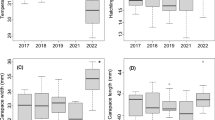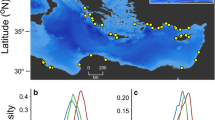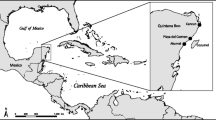Abstract
The magnitude and frequency of extreme warming events over the last decades pose threats to biodiversity. In the near future, heatwaves will become even more frequent and longer-lasting. As ectothermic species, sea turtles are particularly vulnerable to climate change, with their reproductive success and offspring sex ratios dependent on in-nest conditions, particularly temperature. Here, we used field observations and climate model outputs (1) to examine impacts of extreme conditions on reproductive output and (2) to project thermal conditions within nest environments through the year 2100. Data were collected from 225 green turtle nests over 5 years (2009–2013) at Akyatan beach, Turkey, one of the most important nesting sites for this species in the Mediterranean. Our results suggest that green turtle eggs may demonstrate some resilience to rising temperatures if periods of temperature extremes are short. Declines in hatching success were observed only after conditions exceed the 33 °C thermal threshold for two-fifths of the incubation period. Under a moderate climate scenario (RCP 4.5), the number of days above lethal thresholds (i.e., 35 °C) would increase from 1% at the year that the study was conducted to 19.3% in 2100. Although sea turtles have survived through past climate changes, these projections raise concerns about future recruitment success and the persistence of sea turtle populations. Regular monitoring and determination of tipping points at local scales are required to inform conservation and management under global warming.






Similar content being viewed by others
References
Ackerman RA (1997) The nest environment and the embryonic development of sea turtles. In: Lutz P, Musick JA (eds) The Biology of Sea Turtles. CRC Press, Boca Raton, pp 83–106
Almpanidou V, Markantonatou V, Mazaris AD (2019) Thermal heterogeneity along the migration corridors of sea turtles: implications for climate change ecology. J Exp Mar Biol Ecol 520:151223. https://doi.org/10.1016/j.jembe.2019.151223
Bellard C, Berteismeier C, Leadley P, Thuiller W, Courchamp F (2012) Impacts of climate change on the future biodiversity. Ecol Lett 15:365–377. https://doi.org/10.1111/j.1461-0248.2011.01736.x
Bladow RA, Milton SL (2019) Embryonic mortality in green (Chelonia mydas) and loggerhead (Caretta caretta) sea turtle nests increases with cumulative exposure to elevated temperatures. J Exp Mar Biol Ecol 518:151180. https://doi.org/10.1016/j.jembe.2019.151180
Booth DT, Burgess E, Mc Cosker J, Lanyon JM (2004) The influence of incubation temperature on post-hatching fitness characteristics of turtles. Int Congr Ser 1275:226–233. https://doi.org/10.1016/j.ics.2004.08.057
Booth DT, Archibald-Binge A, Limpus CJ (2020) The effect of respiratory gases and incubation temperature on early stage embryonic development in sea turtles. PLoS One 15:e0233580. https://doi.org/10.1371/journal.pone.0233580
Clarke LJ, Elliot RL, Abella-Perez E, Jenkins SR, Marco A, Martins S, Hawkes LA (2021) Low-cost tools mitigate climate change during reproduction in an endangered marine ectotherm. J Appl Ecol in press. https://doi.org/10.1111/1365-2664.13874
Coumou D, Rahmstorf S (2012) A decade of weather extremes. Nat Clim Change 2:491–496. https://doi.org/10.1038/nclimate1452
Cribari-Neto F, Zeileis A (2009) Beta regression in R. Research Report Series / Department of Statistics and Mathematics, WU Vienna University of Economics and Business, Vienna
Cribari-Neto F, Zeileis A (2010) Beta regression in R. J Stat Softw 34:1–24. https://doi.org/10.18637/jss.v034.i02
Darmaraki S, Somot S, Sevault F, Nabat P, Narvaez WDC, Cavicchia L et al (2019) Future evolution of marine heatwaves in the Mediterranean Sea. Clim Dyn 53:1371–1392. https://doi.org/10.1007/s00382-019-04661-z
Davis EB, Cocherell DE, Sommer T, Baxter RD, Hung T, Todgham AE, Fangue NA (2020) Sensitivities of an endemic, endangered California smelt and two nonnative fishes to serial increases in temperature and salinity: implications for shifting community structure with climate change. Conserv Physiol 7:coy076. https://doi.org/10.1093/conphys/coy076
Douma JC, Weedon JT (2019) Analysing continuous proportions in ecology and evolution: a practical introduction to beta and Dirichlet regression. Methods Ecol Evol 10:1412–1430. https://doi.org/10.1111/2041-210X.13234
Esteban N, Laloë JO, Kiggen FS, Ubels SM, Becking LE, Meesters EH, Berkel J, Hays GC, Christianen MJ (2018) Optimism for mitigation of climate warming impacts for sea turtles through nest shading and relocation. Sci Rep 8:1–8. https://doi.org/10.1038/s41598-018-35821-6
Fuentes MMPB, Maynard JA, Guinea M, Bell IP, Werdell PJ, Hamann M (2009) Proxy indicators of sand temperature help project impacts of global warming on sea turtles in northern Australia. Endanger Species Res 9:33–40. https://doi.org/10.3354/esr00224
Giorgi F (2006) Climate change hot-spots. Geophys Res Lett 33:L08707. https://doi.org/10.1029/2006GL025734
Giorgi F, Gutowski Jr WJ (2015) Regional dynamical downscaling and the CORDEX initiative. Annu Rev Environ Resour 40:467–490. https://doi.org/10.1146/annurev-environ-102014-021217
Grose SO, Pendleton L, Leathers A, Cornish A, Waitai S (2020) Climate change will re-draw the map for marine megafauna and the people who depend on them. Front Mar Sci 7:547. https://doi.org/10.3389/fmars.2020.00547
Gudmundsson L, Bremnes JB, Haugen JE, Engen-Skaugen T (2012) Downscaling RCM precipitation to the station scale using statistical transformations–a comparison of methods. Hydrol Earth Sys Sci 16:3383–3390. https://doi.org/10.5194/hess-16-3383-2012
Hays GC, Broderick AC, Glen F, Godley BJ (2003) Climate change and sea turtles: a 150-year reconstruction of incubation temperatures at a major marine turtle rookery. Glob Chang Biol 9:642–646. https://doi.org/10.1046/j.1365-2486.2003.00606.x
Hays GC, Mazaris AD, Schofield G, Laloë JO (2017) Population viability at extreme sex ratio skews produced by temperature dependent sex determination. Proc Royal Soc B 284:20162576. https://doi.org/10.1098/rspb.2016.2576
Houghton JDR, Myers AE, Lloyd C, King RS, Isaacs C, Hays GC (2007) Protracted rainfall decreases temperature within leatherback turtle (Dermochelys coriacea) clutches in Grenada, West Indies: ecological implications for a species displaying temperature dependent sex determination. J Exp Mar Biol Ecol 345:71–77. https://doi.org/10.1016/j.jembe.2007.02.001
Howard R, Bell I, Pike DA (2014) Thermal tolerances of sea turtle embryos: current understanding and future directions. Endanger Species Res 26:75–86. https://doi.org/10.3354/esr00636
Hughes TP, Kerry JT, Baird AH, Connolly SR, Dietzel A, Eakin CM et al (2018) Global warming transforms coral reef assemblages. Nature 556:492–496. https://doi.org/10.1038/s41586-018-0041-2
IPCC (2014) Climate Change 2014: Synthesis Report. Contribution of Working Groups I, II and III to the Fifth Assessment Report of the Intergovernmental Panel on Climate Change. Pachauri RK, Meyer LA (eds). IPCC, Geneva, Switzerland
Laloë JO, Cozens J, Renom B, Taxonera A, Hays GC (2014) Effects of rising temperature on the viability of an important sea turtle rookery. Nature Clim Change 4:513–518. https://doi.org/10.1038/nclimate2236
Laloë JO, Cozens J, Renom B, Taxonera A, Hays GC (2017) Climate change and temperature linked hatchling mortality at globally important sea turtle nesting site. Glob Change Biol 23:1–10. https://doi.org/10.1111/gcb.13765
Mainwaring MC, Barber I, Deeming DC, Pike DA, Roznik AR, Hartley IR (2017) Climate change and nesting behaviour in vertebrates: a review of the ecologcial threats and potential for adaptive responses. Biol Rev 92:1991–2002. https://doi.org/10.1111/brv.12317
Martins S, Silva E, Abella E, de Santos LN, Marco A (2020) Warmer incubation temperature influences sea turtle survival and nullifies the benefit of a female-biased sex ratio. Clim Change 163:689–704. https://doi.org/10.1007/s10584-020-02933-w
Mazaris AD, Matsinos G, Pantis JD (2009) Evaluating the impacts of coastal squeeze on sea turtle nesting. Ocean Coast Manag 52:139–145. https://doi.org/10.1016/j.ocecoaman.2008.10.005
Mazaris AD, Kallimanis AS, Panti JD, Hays GC (2013) Phenological response of sea turtles to environmental variation across species’ northern range. Proc Royal Soc B 280:20122397. https://doi.org/10.1098/rspb.2012.2397
Meinshausen M, Smith SJ, Calvin K, Daniel JS, Kainuma MLT, Lamarque JF, Matsumoto K, Montzka SA, Raper SCB, Riahi K, Thomson A, Velders GJM, van Vuuren DPP (2011) The RCP greenhouse gas concentrations and their extensions from 1765 to 2300. Clim Change 109:213. https://doi.org/10.1007/s10584-011-0156-z
Miller JD (1985) Embryology of marine turtles. In: Gans C, Billet F, Maderson PF (eds) Biology of the Reptilia. Wiley-Liss, New-York, pp 270–328
Miller JD (1997) Reproduction in sea turtles. In: Lutz P, Musick JA (eds) The Biology of Sea Turtles. CRC Press, Boca Raton, pp 51–80
Miller (1999) Determining clutch size and hatching success. In: Eckert KL, Bjorndal KA, Abreu-Grobois FA, Donnelly M (eds) Research and management techniques for the conservation of sea turtles. IUCN/SSC Marine Turtle Specialist Group Publication No. 4, Washington, DC, pp 124–130
Moss RH, Edmonds JA, Hibbard KA, Manning MR, Rose SK, van Vuuren DP, Carter TR et al (2010) The next generation of scenarios for climate change research and assessment. Nature 463:747–756. https://doi.org/10.1038/nature08823
Mueller MS, Ruiz-García NA, García-Gasca A, Abreu-Grobois FA (2019) Best swimmers hatch from intermediate temperatures: effect of incubation temperature on swimming performance of olive ridley sea turtle hatchlings. J Exp Mar Biol Ecol 519:151186. https://doi.org/10.1016/j.jembe.2019.151186
Nadeau CP, Urban MC, Bridle JR (2017) Climates past, present, and yet to come shape climate change vulnerabilities. Trends Ecol Evol 32:786–800. https://doi.org/10.1016/j.tree.2017.07.012
Nenzén HK, Araújo MB (2011) Choice of threshold alters projections of species range shifts under climate change. Ecol Model 222:3346–3354. https://doi.org/10.1016/j.ecolmodel.2011.07.011
Noble DWA, Stenhouse V, Schwanz LE (2018) Developmental temperatures and phenotypic plasticity in reptiles: a systematic review and meta-analysis. Biol Rev 93:72–97. https://doi.org/10.1111/brv.12333
Oliver ECJ, Donat MG, Burrows MT, Moore PJ, Smale DA, Alexander LV et al (2018) Ocean warming brings longer and more frequent marine heatwaves. Nat Commun 9:1324. https://doi.org/10.1038/s41467-018-03732-9
Peterson RA (2020) Package ‘bestNormalize’. Normalizing Transformation Functions. R package version 1.6.1
Peterson RA, Cavanaugh JE (2020) Ordered quantile normalization: a semiparametric transformation built for the cross-validation era. J Appl Stat 47:2312–2232. https://doi.org/10.1080/02664763.2019.1630372
Piani C, Weedon GP, Best M, Gomes SM, Viterbo P, Hagemann S, Haerter JO (2010) Statistical bias correction of global simulated daily precipitation and temperature for the application of hydrological models. J Hydrol 395:199–215. https://doi.org/10.1016/j.jhydrol.2010.10.024
Pike DA (2013) Climate influences the global distribution of sea turtle nesting. Glob Ecol Biogeogr 22:555–566. https://doi.org/10.1111/geb.12025
Poloczanska ES, Limpus CJ, Hays GC (2009) Vulnerability of marine turtles to climate change. Adv Mar Biol 56:151–211. https://doi.org/10.1016/S0065-2881(09)56002-6
Radchuk V, Reed T, Teplitsky C, van de Pol M, Charmantier A, Hassall C et al (2019) Adaptive responses of animals to climate change are most likely insufficient. Nat Commun 10:3109. https://doi.org/10.1038/s41467-019-10924-4
Riddel EA, Iknayan KJ, Wolf BO, Sinervo B, Beissinger SR (2019) Cooling requirements fueled the collapse of a desert bird community from climate change. PNAS 116:21609–21615. https://doi.org/10.1073/pnas.1908791116
Rivas ML, Spínola M, Arrieta H, Faife-Cabrera M (2018) Effect of extreme climatic events resulting in prolonged precipitation on the reproductive output of sea turtles. Ani Conserv 21:387–395. https://doi.org/10.1111/acv.12404
Rivas ML, Esteban N, Marco A (2019) Potential male leatherback hactlings exhibit higher fitness which might balance sea turtle sex ratios in the face of climate change. Clim change 156:1–14. https://doi.org/10.1007/s10584-019-02462-1
Rohr JR, Palmer BD (2013) Climate change, multiple stressors, and the decline of ectotherms. Conserv Biol 27:741–751. https://doi.org/10.1111/cobi.12086
Sanderson BM, O'Neill BC, Tebaldi C (2016) What would it take to achieve the Paris temperature targets? Geophys Res Lett 43:7133–7142. https://doi.org/10.1002/2016GL069563
Santidrián Tomillo P, Spotila JR (2020) Temperature-dependent sex determination in sea turtles in the context of climate change: uncovering the adaptive significance. BioEssays 42:2000146. https://doi.org/10.1002/bies.202000146
Santidrián Tomillo P, Saba VS, Blanco GS, Stock CA, Paladino FV, Spotila JR (2012) Climate driven egg and hatchling mortality threatens survival of Eastern Pacific leatherback turtles. PLoS One 7:e37602. https://doi.org/10.1371/journal.pone.0037602
Santidrián Tomillo P, Saba VS, Lombard CD, Valiulis JM, Robinson NJ, Paladino FV et al (2015) Global analysis of the effect of local climate on the hatchling output of leatherback turtles. Sci Rep 5:16789. https://doi.org/10.1038/srep16789
Santidrián Tomillo P, Fonseca LG, Ward M, Tankersley N, Robinson NJ, Orrego CM et al (2020) The impacts of extreme El Niño events on sea turtle nesting populations. Clim Change 159:163–176. https://doi.org/10.1007/s10584-020-02658-w
Scott R, Marsh R, Hays GC (2012) Life in the really slow lane: loggerhead sea turtles mature late relative to other reptiles. Funct Ecol 26:227–235. https://doi.org/10.1111/j.1365-2435.2011.01915.x
Smale DA, Wernberg T, Oliver EC, Thomsen M, Harvey BP, Straub SC et al (2019) Marine heatwaves threaten global biodiversity and the provision of ecosystem services. Nat Clim Chang 9:306–331. https://doi.org/10.1038/s41558-019-0412-1
Sönmez B (2018) Relationship between metabolic heating and nest parameters in green turtles (Chelonia mydas, L. 1758) on Samandag Beach, Turkey. Zool Sci 35:243–248. https://doi.org/10.2108/zs180003
Stubbs JL, Marn N, Vanderklift MA, Fossette S, Mitchell NJ (2020) Simulated growth and reproduction of green turtles (Chelonia mydas) under climate change and marine heatwave scenarios. Ecol Model 431:109185. https://doi.org/10.1016/j.ecolmodel.2020.109185
Thomsen MS, Mondardini L, Alestra T, Gerrity S, Tait L, South P et al (2019) Local extinction of bull kelp (Durvillaea spp.) due to a marine heatwave. Front Mar Sci 6:84. https://doi.org/10.3389/fmars.2019.00084
Tilley D, Ball S, Ellick J, Godley BJ, Weber N, Weber SB, Broderick AC (2019) No evidence of fine scale thermal adaptation in green turtles. J Exp Mar Biol Ecol 514:110–117. https://doi.org/10.1016/j.jembe.2019.04.001
Turkozan O, Karacaoglu C, Parham JF (2021) Reconstructions of the past distribution of Testudo graeca mitochondrial lineages in the Middle East and Transcaucasia support multiple refugia since the Last Glacial Maximum. Herpetol J 31:9–16. https://doi.org/10.33256/hj31.1.1017
Vindas-Picado J, Yaney-Keller A, Andrews LS, Panagopoulou A, Santidrián Tomillo P (2020) Effectiveness of shading to mitigate the impact of high temperature on sea turtle clutches considering the effect on primary sex ratios. Mitig Adapt Strateg Glob Chang 25:1509–1521. https://doi.org/10.1007/s11027-020-09932-3
Weber SB, Broderick AC, Groothhuis TGG, Ellick J, Godley BJ, Blount JD (2012) Fine-scale thermal adaptation in a green turtle nesting population. Proc Royal Soc B 279:1077–1084. https://doi.org/10.1098/rspb.2011.1238
Westerbom M, Mustonen O, Jaatinen K, Kilpi M, Norkko A (2019) Population dynamics at the range margin: Implications of climate change on sublittoral Blue Mussels (Mytilus trossulus). Front Mar Sci 6:292. https://doi.org/10.3389/fmars.2019.00292
Wild S, Krützen M, Rankin RW, Hoppitt WJ, Gerber L, Allen SJ (2019) Long-term decline in survival and reproduction of dolphins following a marine heatwave. Curr Biol 29:R239–R240. https://doi.org/10.1016/j.cub.2019.02.047
Wood SN (2011) Fast stable restricted maximum likelihood and marginal likelihood estimation of semiparametric generalized linear models. J R Stat Soc Series B 73:3–36. https://doi.org/10.1111/j.1467-9868.2010.00749.x
Yilmaz C, Oruç A, Türkozan O (2015) Marine turtles (Chelonia mydas and Caretta caretta) nesting along the eastern Mediterranean coast of Turkey: Results from six years of surveying. Herpetol J 25:197–204
Acknowledgments
The data of this study were collected under a protocol between the 7th District of Forest and Water Ministry of Turkey and WWF-Turkey. The authors would like to thank Bryan Wallace that he helped to improve the manuscript.
Availability of data and material
All data needed to evaluate the conclusions of the paper are presented in the paper. Additional data related to this paper may be requested from the authors.
Code availability
Not applicable.
Funding
The fieldwork and the technical equipment of this project are supported by MAVA Foundation, Garanti Bank, UNDP-GEF Small Grant Programme (SGP), the Dutch Embassy in Turkey, and individual supporters of the Adopt a Marine Turtle Programme of WWF Turkey.
Author information
Authors and Affiliations
Corresponding author
Ethics declarations
Ethics approval
This study was carried out under permission of 7th District of Forest and Water Ministry of Turkey.
Consent for publication
The authors guarantee that the MS has not been previously published elsewhere, or that if it has been published in whole or in part, any permission necessary to publish it.
Consent to participate
The authors declare that any person named as co-author of the contribution is aware of the fact and has agreed to being so named.
Conflict of interest
The authors declare that they have no conflicts of interest.
Additional information
Publisher’s note
Springer Nature remains neutral with regard to jurisdictional claims in published maps and institutional affiliations.
Rights and permissions
About this article
Cite this article
Turkozan, O., Almpanidou, V., Yılmaz, C. et al. Extreme thermal conditions in sea turtle nests jeopardize reproductive output. Climatic Change 167, 30 (2021). https://doi.org/10.1007/s10584-021-03153-6
Received:
Accepted:
Published:
DOI: https://doi.org/10.1007/s10584-021-03153-6




